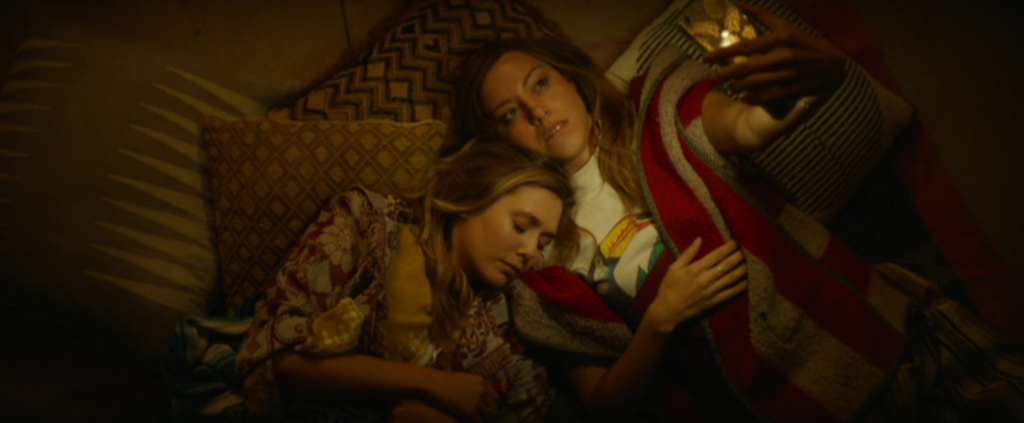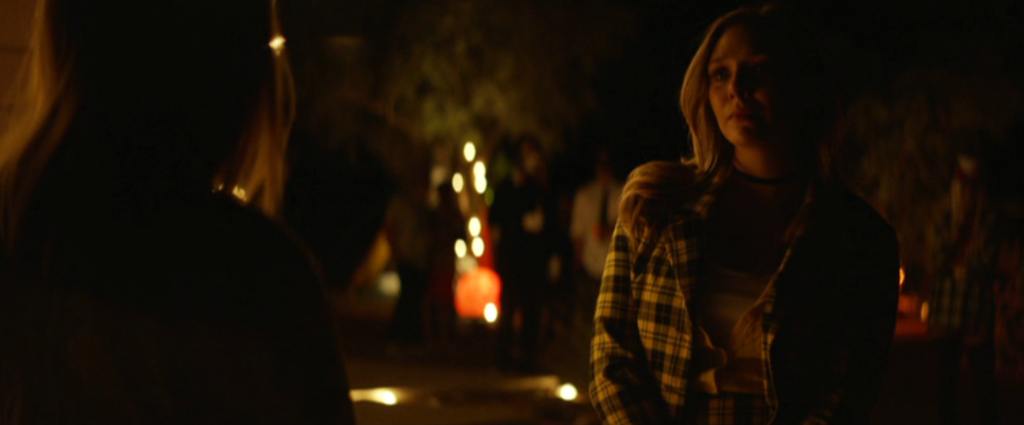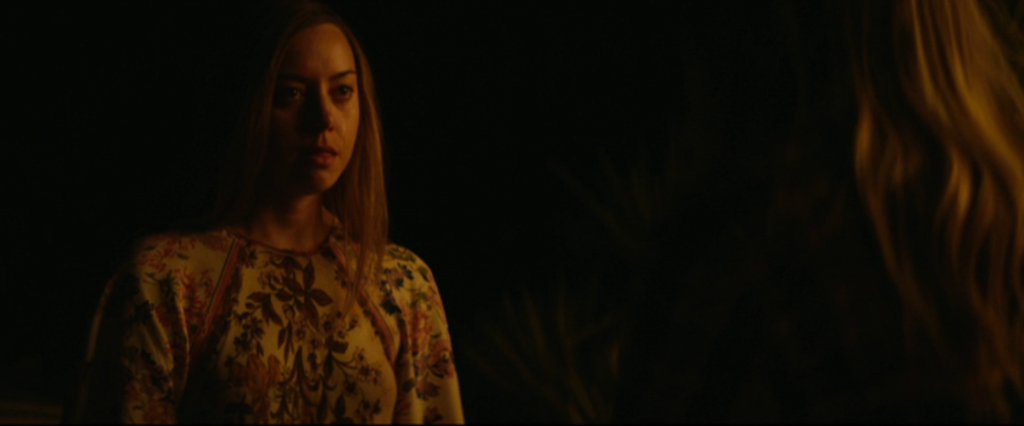Our relationship with technology has made us the most interconnected and–simultaneously–depersonalized society in history. Social media has become more than just a form of communication; it is a collective consciousness, a mirror we obsessively gaze into to reflect upon and critique ourselves. And Instagram follower Ingrid Thorburn (Aubrey Plaza) is the harshest critic of all.
Written and directed by Matt Spicer, his debut feature, Ingrid Goes West (2017), focuses on social media stalker and antiheroine, Ingrid: a mentally unstable young woman who lives an introverted life in Pennsylvania. When Ingrid realizes that she didn’t receive an invitation to her “friend” Charlotte Buckwald’s (Meredith Hagner) wedding–her instability exacerbated by the recent death of her mother–she gatecrashes the reception and, after pepper-spraying Charlotte, is institutionalized. Inheriting a small fortune from her deceased mother upon her release, Ingrid decides to pursue the glitz and glamour of LA life–and the new object of her desire: Instagram celebrity Taylor Sloane (Elizabeth Olsen).
Aubrey Plaza has proven herself to be a talented character actor and comedian; most notably, through her portrayal as the pokerfaced intern/assistant April Ludgate on the NBC sitcom Parks and Recreation (2009-2015). Over the past decade or so, Plaza has cultivated her deadpan on-screen persona; of particular mention is her performance as Darius Britt, a quirky young intern at a Seattle-based magazine, in the eccentric dramedy Safety Not Guaranteed (2012). In black comedy Ingrid Goes West, Plaza plays an isolated and self-doubting social media obsessor; this role allows her to mine her deadpan-style comedy, as well as enabling Plaza to demonstrate her versatility as a dramatic actor. Elizabeth Olsen portrays Taylor as a seemingly perfect but, in reality, deeply insecure Instagram star; and O’Shea Jackson Jr. brings a lighthearted dimension to the film’s serious subject matter as the likeable Dan Pinto, Ingrid’s landlord/love interest, who also happens to be a Batman-obsessed screenwriter.
Recently, discourse assessing the link between social media and mental health in film has been established; the biopic The Social Network (2010), based on Mark Zuckerberg’s (Jesse Eisenberg) creation of Facebook significantly explores this theme. The extremes of our love-hate relationship with social media have also been examined in: documentary film Catfish (2010), which centers on Yaniv Schulman’s online relationship with Megan, a young woman he meets on Facebook; Spike Jonze’s Her (2013), focusing on Theodore Twombly’s (Joaquin Phoenix) connection with his intelligent, seemingly sentient computer operating system, Samantha (voiced by Scarlett Johansson); and the 2016 techno-thriller Nerve, in which protagonist Venus “Vee” Delmonico (Emma Roberts) engages in an online truth-or-dare video game, where, as a “player,” she accepts dares from “watchers” to receive monetary rewards, allowing her to advance through the game.
Historically, film has presented a largely marginalized and, subsequently, negative representation of mental illness. On the face of it, Ingrid Goes West appears to perpetuate this stigma–Ingrid’s psychological imbalance is initially ostracized through the film’s depiction of her as the stereotypically violent and dangerous psychopath. Moreover, during the film’s setup, her mental disability ostensibly functions as both a contrived plot device and a means to elicit humour.
Nevertheless, as the narrative develops, Spicer has the intuition to alter the film’s comedic tone. Ingrid’s volatile interpersonal relationships throughout the film suggest that she is suffering from a type of personality disorder; however, for the most part, the focus is not on her mental state but, rather, the degree to which people accept her behavior. This subsequently positions the audience as a mediator between Ingrid, her interaction with social media, and, ultimately, how she associates with other people.
After failing to make an impression on Taylor during a chance encounter in a bookstore, Ingrid decides to kidnap Taylor’s beloved dog, Rothko. Upon “finding” and returning Rothko, she is promptly welcomed into the lives of Taylor and her husband, Ezra O’ Keefe (Wyatt Russell). As Ingrid embarks upon this new friendship, she immediately begins to Instagram the experience–down to the specific beauty products in Taylor’s bathroom. The film represents Ingrid and Taylor’s online activity pictorially; sardonic voiceover narration is also employed as they document their day-to-day lives via social media, consequently encouraging the audience to form a more intimate and self-reflective bond with the protagonists, as well as reinforcing social media as the filter through which these characters shape their interactions. Plaza’s characterization as the fixated and delusional fan echoes Jessica Walter’s performance as Evelyn Draper in Play Misty for Me (1971), and Kathy Bates’s depiction as Annie Wilkes in Misery (1990). Within one especially important scene, in a conversation between Taylor and Ingrid during the course of their road trip together, Taylor confides in her: apprehensively sharing her plan to buy a house in Joshua Tree and transform it into a boutique hotel. With admiration, Ingrid sincerely states: “You are by far the coolest, most interesting person I have ever met.” Taylor candidly responds: “My God. Thank you. You’re a really good friend, Ingrid.” In this character-defining moment, the habitually lonely Ingrid feels accepted; she has gained Taylor’s trust, become her close friend, and, in doing so, has successfully constructed the idealized life she envisaged when she left Pennsylvania.

Taylor (Elizabeth Olsen) LEFT, Ingrid (Aubrey Plaza) RIGHT, as Ingrid takes a selfie with Taylor while she is asleep, in Joshua Tree, California. Ingrid Goes West (Universal Pictures, 2017)
However, when Taylor’s rebellious brother Nicky Sloane (Billy Magnussen) comes to visit, and Taylor befriends his acquaintance, fashion blogger Harley Chung (Pom Klementieff), Ingrid once again feels increasingly isolated. Nicky proceeds to steal Ingrid’s phone and, when he discovers it contains private information about his sister, he hastily informs Taylor; at which point, she severs all ties with Ingrid. In a desperate attempt to reintegrate herself into Taylor’s life, Ingrid uses the remainder of her inheritance to purchase the house next-door to Taylor and Ezra’s (the house Taylor wanted to buy). During Ingrid and Taylor’s final exchange, in a distraught tone of voice, Ingrid exclaims: “Ezra told me everything, OK? He told me that when you moved here, you were lame and basic, and you had no friends. You were just like me.” In a broken voice, Taylor sarcastically explains: “You know what, Ingrid? Um . . . I was uh . . . actually never like you. Because you are a sad and pathetic and very sick person. And you need professional help.” In this moment, Ingrid acknowledges that her friendship with Taylor is unsalvageable; her perception of Taylor and her own life was fabricated and, perhaps, on some level, she realizes that she is unwell.

Taylor (Elizabeth Olsen) during her final meeting with Ingrid (Aubrey Plaza), outside Taylor’s house, in Joshua Tree, California. Ingrid Goes West (Universal Pictures, 2017)

Ingrid (Aubrey Plaza) in her last conversation with Taylor (Elizabeth Olsen), outside Taylor’s house, in Joshua Tree, California. Ingrid Goes West (Universal Pictures, 2017)
Ingrid Goes West has been criticized for offering a romanticized and, therefore, negative portrayal of mental illness. The film does appear to conform to a classical Hollywood ending; upon waking in hospital, after her suicide attempt via a drug overdose, Ingrid learns that her suicide note–a video she made for her Instagram page–has gone viral, and has made her a celebrity overnight. Even though the film seems to end with equilibrium, it can be argued that its “happy ending” actually serves to underscore the severity of Ingrid’s mental disability, by presenting an unflinching look at her relationship with social media; and consequently providing a largely realistic/positive depiction of mental illness as well as demythologizing the construct of celebrity. By extension, this enables Ingrid Goes West to both destigmatize a mythological representation of mental illness in film and, as a social satire, the film’s quasi-documentary style encourages us to scrutinize the extent of our own interdependent/codependent connection with social media.
For better or for worse, social media has fundamentally transformed our subjective experience of reality. It has become a grand narrative, a universal truth, and as such, our affiliation with social media has come to be integrally, and perhaps, inextricably associated with our mental well-being. We may not like Ingrid, or condone her actions but we do empathize with–and, ultimately, recognize–her.
Author Biography
Luke Batten graduated from Solent University, UK, with a BA in Film and Television Studies. His approach to film criticism is focused on film’s sociological implications. His publications include: “(500) Days of Manipulation: Challenging the Romcom” (2015), Anna Kendrick: Acting Real in Tinseltown (2017), and “Groundhog Day: The Day Before Tomorrow” (2017).
Film Details
Ingrid Goes West (2017)
USA
Director Matt Spicer
Runtime 98 minutes








































